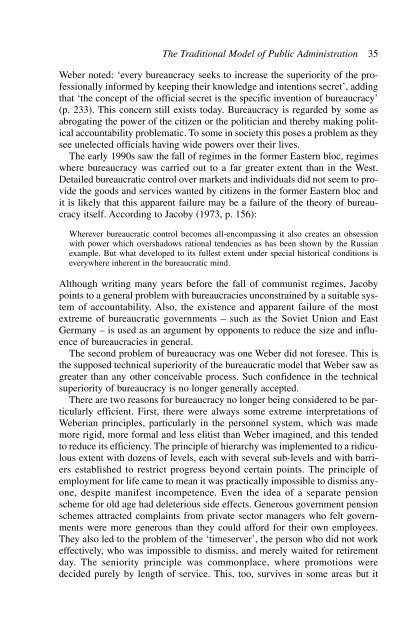Public Management and Administration - Owen E.hughes
Public Management and Administration - Owen E.hughes
Public Management and Administration - Owen E.hughes
Create successful ePaper yourself
Turn your PDF publications into a flip-book with our unique Google optimized e-Paper software.
The Traditional Model of <strong>Public</strong> <strong>Administration</strong> 35<br />
Weber noted: ‘every bureaucracy seeks to increase the superiority of the professionally<br />
informed by keeping their knowledge <strong>and</strong> intentions secret’, adding<br />
that ‘the concept of the official secret is the specific invention of bureaucracy’<br />
(p. 233). This concern still exists today. Bureaucracy is regarded by some as<br />
abrogating the power of the citizen or the politician <strong>and</strong> thereby making political<br />
accountability problematic. To some in society this poses a problem as they<br />
see unelected officials having wide powers over their lives.<br />
The early 1990s saw the fall of regimes in the former Eastern bloc, regimes<br />
where bureaucracy was carried out to a far greater extent than in the West.<br />
Detailed bureaucratic control over markets <strong>and</strong> individuals did not seem to provide<br />
the goods <strong>and</strong> services wanted by citizens in the former Eastern bloc <strong>and</strong><br />
it is likely that this apparent failure may be a failure of the theory of bureaucracy<br />
itself. According to Jacoby (1973, p. 156):<br />
Wherever bureaucratic control becomes all-encompassing it also creates an obsession<br />
with power which overshadows rational tendencies as has been shown by the Russian<br />
example. But what developed to its fullest extent under special historical conditions is<br />
everywhere inherent in the bureaucratic mind.<br />
Although writing many years before the fall of communist regimes, Jacoby<br />
points to a general problem with bureaucracies unconstrained by a suitable system<br />
of accountability. Also, the existence <strong>and</strong> apparent failure of the most<br />
extreme of bureaucratic governments – such as the Soviet Union <strong>and</strong> East<br />
Germany – is used as an argument by opponents to reduce the size <strong>and</strong> influence<br />
of bureaucracies in general.<br />
The second problem of bureaucracy was one Weber did not foresee. This is<br />
the supposed technical superiority of the bureaucratic model that Weber saw as<br />
greater than any other conceivable process. Such confidence in the technical<br />
superiority of bureaucracy is no longer generally accepted.<br />
There are two reasons for bureaucracy no longer being considered to be particularly<br />
efficient. First, there were always some extreme interpretations of<br />
Weberian principles, particularly in the personnel system, which was made<br />
more rigid, more formal <strong>and</strong> less elitist than Weber imagined, <strong>and</strong> this tended<br />
to reduce its efficiency. The principle of hierarchy was implemented to a ridiculous<br />
extent with dozens of levels, each with several sub-levels <strong>and</strong> with barriers<br />
established to restrict progress beyond certain points. The principle of<br />
employment for life came to mean it was practically impossible to dismiss anyone,<br />
despite manifest incompetence. Even the idea of a separate pension<br />
scheme for old age had deleterious side effects. Generous government pension<br />
schemes attracted complaints from private sector managers who felt governments<br />
were more generous than they could afford for their own employees.<br />
They also led to the problem of the ‘timeserver’, the person who did not work<br />
effectively, who was impossible to dismiss, <strong>and</strong> merely waited for retirement<br />
day. The seniority principle was commonplace, where promotions were<br />
decided purely by length of service. This, too, survives in some areas but it











